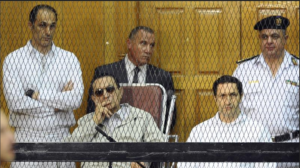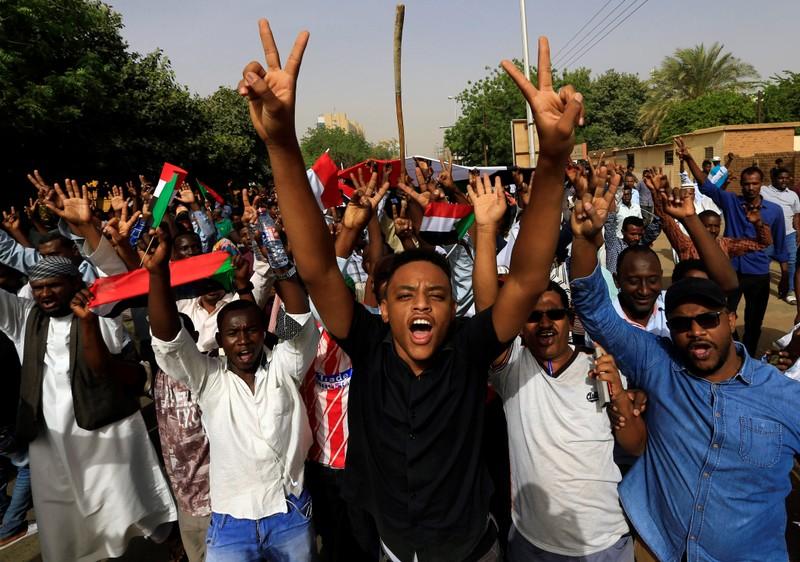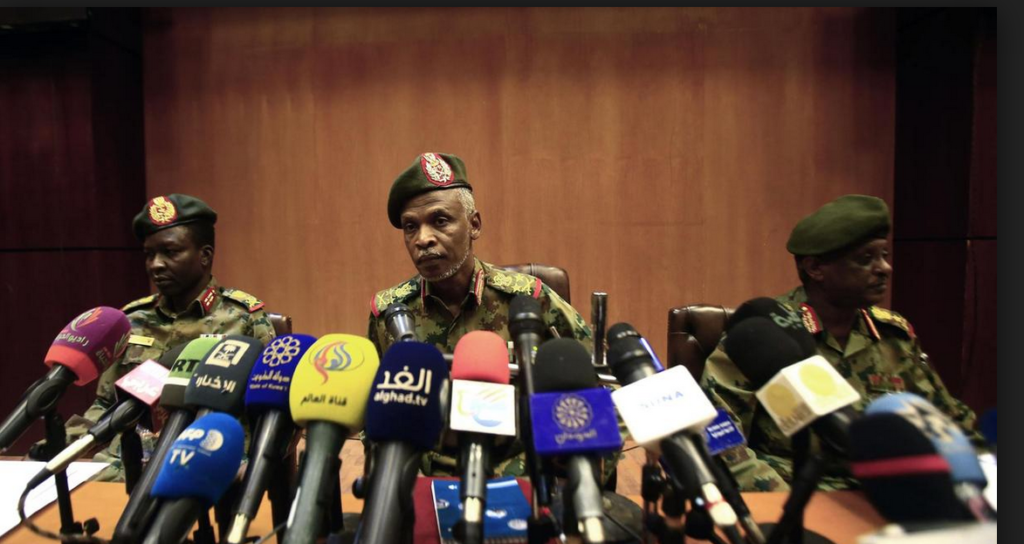Sudanese protesters have been forced to block an apparent attempt to break up their sit-in outside the defence ministry in Khartoum, where demonstrators have been pushing for a quick transition to civilian rule after Omar al-Bashir was ousted as president.
On Thursday, Sudan’s army announced it had removed and detained Bashir after three decades in power and was setting up a transitional military council to run the country [for two years].
Since then the heads of the council and Sudan’s powerful intelligence services have both been replaced, as protesters have continued to call for change.
(The Guardian, April 15, 2019)
We’ve seen this kind of surprising uprising before. And, given how it played out in neighboring Egypt, these Sudanese protesters would do well to take heed.
 No doubt you recall the mass protests of 2011 (a.k.a. the Arab Spring). They triggered the ouster of Egypt’s Hosni Mubarak after three decades in power … too. But just the titles to some of my commentaries on what followed there give a sense of what portends in Sudan:
No doubt you recall the mass protests of 2011 (a.k.a. the Arab Spring). They triggered the ouster of Egypt’s Hosni Mubarak after three decades in power … too. But just the titles to some of my commentaries on what followed there give a sense of what portends in Sudan:
- “Army Pledges No Force against Protesters,” February 1, 2011
- “Protesters Return to Tahrir Square,” June 6, 2012
- “Egyptians Continue March Back to the Future,” December 20, 2013
- “Egypt’s Arab Spring Spawns Brutal Military Dictatorship,” March 25, 2014
- “Egypt Sentences Morsi to Death: Exposes Fecklessness of US Mideast Policy,” May 20, 2015
- “
 Sisi Completes Egypt’s Vicious Cycle by Releasing Mubarak,” March 24, 2017
Sisi Completes Egypt’s Vicious Cycle by Releasing Mubarak,” March 24, 2017 - “Egypt’s Sisi Aping Russia’s Putin to Continue Serving … for Life,” March 26, 2018
The first of these turned out to be most prescient, including as it does this sobering and equally relevant observation:
With all due respect to the protesters, the issue is not whether Mubarak will go, for he will. … The issue is who will replace him. And it appears they have not given any thought whatsoever to this very critical question. …
The devil the Egyptians know might prove far preferable to the devil they don’t. Just ask the Iranians who got rid of the Mubarak-like Shah in 1979 only to end up with the Ayatollah Khomeini — whose Islamic revolution they’ve regretted (and have longed to overturn) ever since.
I fear that, like the Egyptians, the Sudanese will end up replacing one devil with another. I just hope theirs is more benign.
In the interim, precarious is the fate of any civilian leader who succeeds Bashir. One need only look at what has befallen Mohamed Morsi.
He presumed Egypt’s military leaders, including then General Abdel Fattah el-Sisi, would allow him to govern according to his historic democratic mandate. But today he’s rotting away in prison – perhaps even thanking Sisi for commuting his death sentence.
Now president, Sisi is doing all he can to help Sudan install a leader like him. He is clearly doing so because championing “democratic dictatorships” in surrounding countries will help secure his own in Egypt.
But he’s also doing so in furtherance of a new world order of metastasizing dictatorships – headed by Xi of China and Putin of Russia. Indeed, it’s noteworthy that, like Sisi of Egypt, Déby of Chad is following this China-Russia model of the strongman leading for life. And, like Sudan, both Libya and Algeria have wannabe strongmen now engaged in a deadly battle of wits to emulate Sisi, respectively.
 Meanwhile, President Trump seems more interested in comradery with dictators wielding autocratic power than fraternity with protesters seeking democratic freedoms.
Meanwhile, President Trump seems more interested in comradery with dictators wielding autocratic power than fraternity with protesters seeking democratic freedoms.
At the White House today, President Trump hosted his Egyptian counterpart, and the two addressed each other like old friends. That worries human rights groups. The Egyptian government has jailed tens of thousands of people as it cracks down on political activity, and it is trying to tighten state control even further.
(NPR, April 9, 2019)
In fairness to Trump, though, the sympathy his predecessor, Barack Obama, offered Egyptian protesters did them no good. This might explain why no Western leader seems even remotely interested in what becomes of Sudan. Of course, Brexit has European leaders so awash in political futility these days, they could be forgiven feelings of utter fecklessness where Sudan is concerned.
In any case, the result is that, for the first time in modern history, democratic leaders from the West are effectively ceding influence all over Africa to dictatorial leaders from the East.
That said, I couldn’t be happier to see Bashir ousted. To give a sense of the many reasons why, here is an excerpt from “Alas, the ICC Charging President Bashir of Sudan with Genocide Means Nothing! July 15, 2008:
____________________
The only reason Bashir has been able to get away with his alleged crimes is that the US has not deemed stopping him a matter of national (economic) interest.
 This raises the question: What is the point of charging him if the ICC has no power to arrest him?
This raises the question: What is the point of charging him if the ICC has no power to arrest him?
I submit that the ICC has announced these feckless charges in a vain attempt to assuage the collective guilt of western countries. After all, they did not lift a finger to stop Bashir’s Arab militias from killing over 300,000 black Africans and forcing another 2 million to flee their homes in Darfur. This, because they dared to oppose his Islamic-based government.
The UN, US, and EU had promised that, never again, would they allow anyone to perpetrate another Rwandan-style genocide in Africa. This genocide made a mockery of that promise.
____________________
Bashir knew he had nothing to fear from the ICC but fear itself. This, especially given the lengths to which even democratic countries like South Africa were willing to go to help him escape justice. I vented dismay in “Abetting Sudan’s Bashir Betrays All That’s Wrong with African Leaders,” June 15, 2015:
____________________
 African leaders are beaming with foolish pride today over the way they conspired to help Sudanese President Omar al-Bashir abscond from justice. They perpetrated this conspiracy during an African Union summit in South Africa last weekend. …
African leaders are beaming with foolish pride today over the way they conspired to help Sudanese President Omar al-Bashir abscond from justice. They perpetrated this conspiracy during an African Union summit in South Africa last weekend. …
Instead of abetting him, you’d think black African leaders would want to tar and feather Bashir. Except that far too many of them have more in common with him than their own people. None more so than Zimbabwean President Robert Mugabe — who has implemented policies and ordered brutal crackdowns that have killed and displaced as many, if not more black Africans during his 35-year dictatorship.
____________________
This is why I cannot blame the people of Sudan for taking matters into their own hands. And I commend the Sudanese Professional Association and other NGOs for coordinating non-violent efforts to keep the eyes of protesters on the prize: a civilian-led government and a re-secularization of the country away from the Islamization Bashir imposed.
But I fear that, despite making one political concession after another, Sudan’s military leaders will continue to wield the kind of power they did during Bashir’s dictatorship. They have too much vested in seeing another military strongman succeed Bashir – the way Sisi (eventually) succeeded Mubarak. Again, one need only look at what has become of Egypt’s “civilian-led government.”
In a similar vein, I fear that, despite pretending to prosecute him, Sudan’s military will make sure Bashir lands with a golden parachute, eventually – the way Egypt’s made sure Mubarak landed, eventually.
This is why protesters would at least have banked some consolation if they had completed the job – the way the people of Libya did when they ousted Muammar Gadaffi after four decades in power. I duly commented/celebrated in “Gadaffi Is Dead,” October 21, 2011.
In any event, I wish the people of Sudan well. And, for what it’s worth, if I were there, I’d be protesting too.
Related commentaries:
Sisi completes cycle…
charging Bashir…
Abetting Bashir…
Gaddafi is dead…


